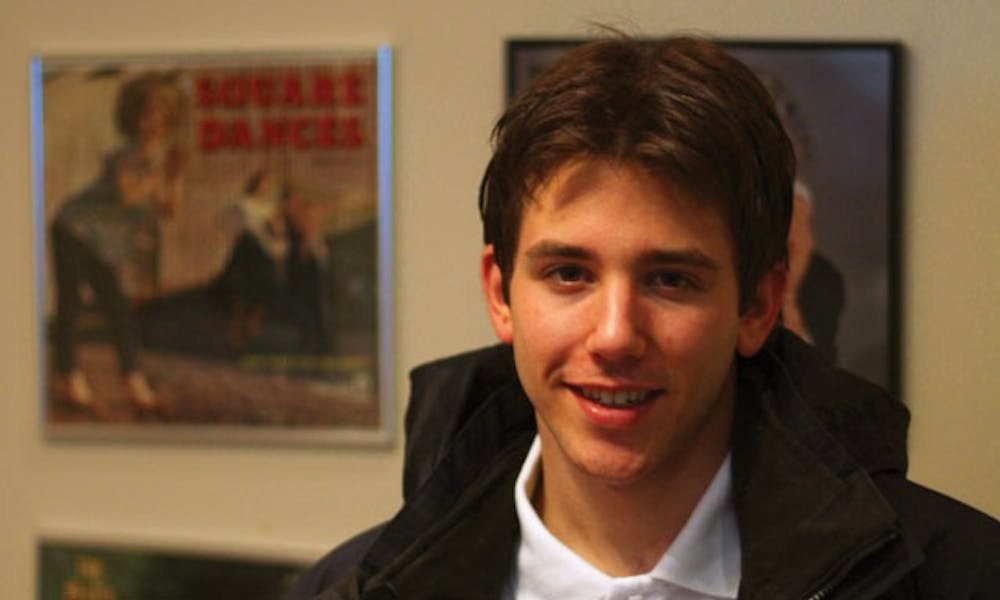Jared Dunnmon met me for an interview at the Bella Union. Wearing water-repellent outerwear, a diving watch and five o’clock shadow, he looks like James Franco in 127 Hours—a film in which Franco plays a hiker who escapes from under a fallen rock by cutting off his own arm with a pocketknife. And as an economics and mechanical engineering double major who has taken six credits in all but two semesters, an Angier B. Duke Scholar ranked eighth in the Pratt School of Engineering with a 3.97 G.P.A. and Duke’s 2011 Rhodes Scholar, Dunnmon displays self-amputation-esque (read: high) levels of intensity and intentionality—which he applies toward problems of sustainable development. His big question: “How do you provide energy to continue human development,” he asks, “without irreparably damaging the environment from which that energy comes?”
To that end, Dunnmon’s research at Duke has sought to find new ways to harvest renewable energy. With Dr. Earl Dowell, the chair, William Holland Hall Professor and Dean Emeritus of aerodynamics and fluid mechanics research in the mechanical engineering and materials science department, he worked to design a piezoelectric energy harvester that gathers voltage from an oscillating metal beam. He’s worked with Dr. Jonathan Protz, another professor from the same department, to develop miniature turbines designed to capture energy from wind in small spaces. And at Oxford, Dunnmon intends to pursue a master’s degree in mathematical modeling and scientific computing with a one-year degree in energy policy while continuing research in renewable fuel technologies. According to Protz, it’s Dunnmon’s thorough preoccupation with contemporary problems that makes him an exceptional scholar.
“Jared’s always been exceedingly engaged in real-world problems and very inquisitive,” he said. “Over the years, he’s continued to develop breadth and depth and has also shown an increasing interest in important social issues. The recognition he’s receiving as a Rhodes Scholar is very well deserved.”
Walking through Hudson Hall—home to several engineering labs—he receives this recognition from a bearded grad student who congratulates him for “that thing you won.” He only has 15 minutes for our meeting, and during it he shows me a wind tunnel alongside missile bodies, a 3-D printer, some kind of electromagnetic levitation device and a massive die-cut candy dispenser. He doesn’t talk about how things work—that much is assumed knowledge for Pratt Stars—but their possibilities, the projects you can tackle and the problems you can address. Jared is a proactive intellectual, and Dr. Alex Rosenberg, director of the A.B. Duke Scholars program and the R. Taylor Cole professor of philosophy, sees this as Dunnmon’s competitive advantage.
“They say still waters run deep—Jared isn’t still, but he runs deep,” Rosenberg said. “When you drop the right lines, you discover how deep the pool is. Start out talking about politics, and you start talking about Tacitus. Start out talking about global warming, and you start talking about thermodynamics.”
Dunnmon’s good friend Brian Solomon, also a senior, sees his drive as a crucial ingredient to his accomplishments.
“Jared’s top-of-the-line brilliant, but what puts him past everybody else is that he’s one hell of a worker,” Solomon said. “He works harder than anyone else that I know. Being so smart and outworking everyone is his equation for success.”
I ask him about his favorite moments at Duke. He gives me three distinctly different answers—watching Gerald Henderson dunk in Cameron, singing Handel’s Messiah during the Chapel’s Christmas service, and watching his electroelastic beam energy harvester work for the first time (“Imagine a little metal flag waving back and forth twenty cycles a second,” he said.) Rosenberg maintains that these diverse talents and interests made Dunnmon a highly competitive Rhodes candidate.
“What is it about Jared that’s remarkable? It’s the package,” he said. “It’s not often that you get someone who’s a serious research scientist, a deep student of the classics—fluent in Greek and Latin—a person with significant musical gifts and someone with a mean backhand.”
Aside from singing in the Duke Chorale, playing club tennis and holding a patent pending on building materials, Dunnmon has also worked on a Clinton Global Initiative Energy project and served as an environmental policy intern for the mayoralty of San Francisco.
At the end of our interview, Dunnmon apologizes. He’d just gotten in from a global energy conference in Abu Dhabi—with gold-encrusted chocolate cake receptions—and was jet-lagged and not “in a particularly quotable state of mind.” But when I ask him if he has a thesis statement to life, he proved this false: “Life is about memories. Hopefully one day when I’m 100 years old and decrepit and in a wheelchair and can’t move, I’ll be happy if I look back and have never passed up an opportunity to create a memory,” he said. “If it’s something I’m not going to remember, I don’t do it—like get blackout drunk, because that’s a direct assault on memory.”
And as he gets up, I ask him if he has any advice for Rhodes aspirants.
“Try not to pass up anything at Duke. Except finance information sessions.”
Get The Chronicle straight to your inbox
Signup for our weekly newsletter. Cancel at any time.

